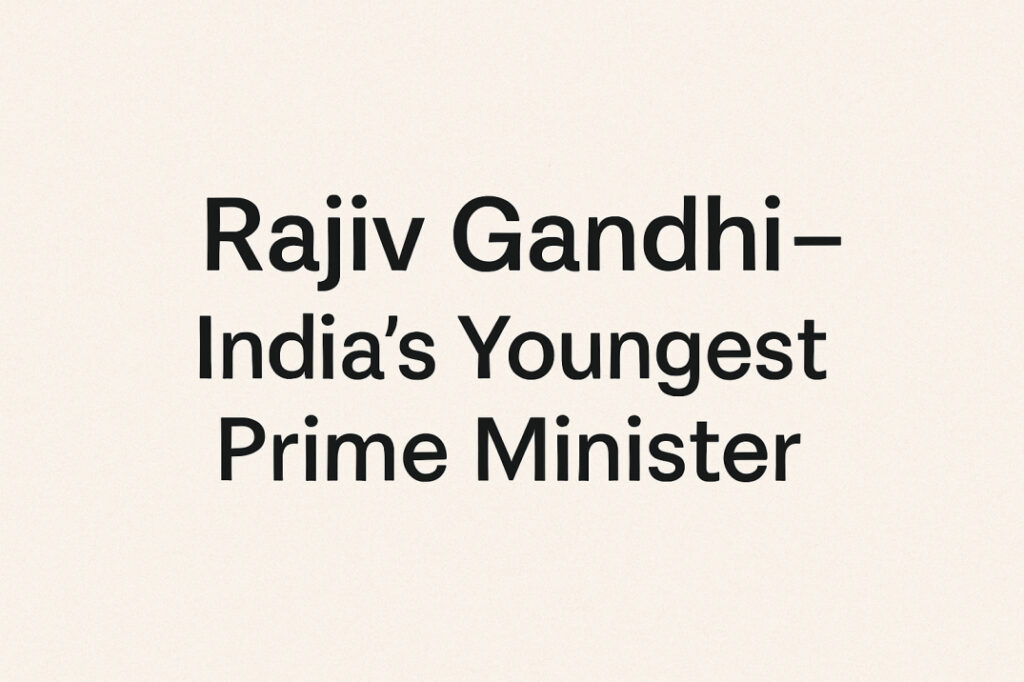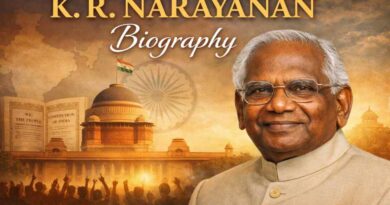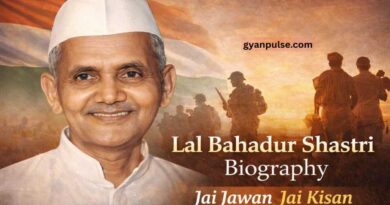Rajiv Gandhi Biography – Early Life, Political Career, Assassination & Legacy, 2025 updated full details
Rajiv Gandhi Biography – Early Life, Political Career, Assassination & Legacy, 2025 updated full details.
Rajiv Gandhi Biography – The Youngest Prime Minister of India
Rajiv Gandhi, the son of Indira Gandhi and grandson of Jawaharlal Nehru, was born on August 20, 1944, in Bombay (now Mumbai). He played a significant role in shaping modern India through technology, education, and foreign policy. His political journey was unexpected, and his life ended tragically at a young age.
Early Life and Education
Rajiv Gandhi grew up in Delhi and Dehradun, where he spent most of his early childhood and school years. He attended Doon School, a prestigious institution in India. After finishing school, he went abroad to study at Imperial College, London, and later at Trinity College, Cambridge, although he did not complete a degree.
Unlike his mother and younger brother, Rajiv had little initial interest in politics. He trained as a pilot in India and joined Indian Airlines as a commercial pilot.
He married Sonia Maino, an Italian woman, in 1968. They were blessed with two children – Rahul Gandhi and Priyanka Gandhi.
Table of Contents
Entry into Politics
Rajiv Gandhi entered politics only after the tragic death of his younger brother Sanjay Gandhi in a plane crash in 1980. Under pressure from the Congress Party and his mother, then Prime Minister Indira Gandhi, Rajiv joined active politics.
He contested and won the Amethi Lok Sabha seat in Uttar Pradesh and became a Member of Parliament.
Becoming Prime Minister
Following Indira Gandhi’s assassination in October 1984, Rajiv Gandhi took oath as India’s 6th Prime Minister, making history as the youngest person to hold the post at just 40 years old. His party won a landslide victory in the general elections held soon after, with Congress securing over 400 seats.
Key Contributions
- Modernization and Technology: Rajiv Gandhi played a key role in bringing computers and modern communication systems to India, laying the foundation for the country’s tech-driven future. He pushed for scientific innovation and was instrumental in bringing IT and telecom revolutions.
- Panchayati Raj and Education: He emphasized grassroots democracy and education reform. He worked to empower local self-governance and strengthen primary education.
- Foreign Policy: Rajiv maintained balanced relations with global powers and improved ties with the United States and Soviet Union.
- Anti-Defection Law: His government passed the 52nd Amendment, discouraging political defections and promoting political stability.

5 Important Life Lessons from Rajiv Gandhi:
- Step Up When Duty Calls
Despite being uninterested in politics initially, Rajiv Gandhi took responsibility after his brother’s death and eventually led the nation.
Lesson: Sometimes, life puts us in roles we never imagined — rise to the occasion.
- Embrace Technology and Change
Rajiv strongly advocated for computers, IT, and modernization in India during a time of resistance.
Lesson: Be a forward-thinker. Embracing change can shape the future positively.
- Youth Can Lead a Nation
At just 40, he became the youngest Prime Minister of India and inspired millions of young Indians.
Lesson: Age is not a barrier to leadership — vision, clarity, and courage matter more.
- Stay Calm in Crisis
From family tragedy to political pressure, Rajiv maintained composure and decisiveness.
Lesson: Stay calm and focused during challenges — that’s true leadership. - Legacy Is Built on Vision, Not Time
Though his tenure was short, his emphasis on digital India, education, and local governance left a lasting impact.
Lesson: Leadership isn’t measured by how long you serve, but by the impact and purpose you bring during your time.
Controversies and Decline
Rajiv Gandhi’s tenure wasn’t without controversy. The biggest blow came with the Bofors scandal, a defense deal that allegedly involved kickbacks. This tarnished his image and led to a decline in popularity.
In the 1989 general elections, the Congress Party lost power, and as a result, Rajiv Gandhi took on the role of Leader of the Opposition in the Lok Sabha.
Assassination and Death
On May 21, 1991, while campaigning in Sriperumbudur, Tamil Nadu, Rajiv Gandhi was tragically assassinated by a suicide bomber linked to the LTTE (Liberation Tigers of Tamil Eelam). The attack claimed his life along with several others, shocking the entire nation. The blast killed him instantly, along with several others.
His death shocked the nation and the world.
Legacy
Rajiv Gandhi is remembered for:
- Championing technology-driven development
- Strengthening youth participation in politics
- Advocating for a 21st-century India
Numerous institutions, awards, and schemes are named after him, including the Rajiv Gandhi Khel Ratna Award (now renamed Major Dhyan Chand Khel Ratna Award) and Rajiv Gandhi University of Health Sciences.
Final Thoughts
Rajiv Gandhi’s life was a blend of tragedy, hope, and transformation. Though his political career was brief, his vision for a modern and technologically advanced India laid the foundation for many future developments. He continues to be remembered as a young leader with bold ideas.
Read more Biography
![]()




